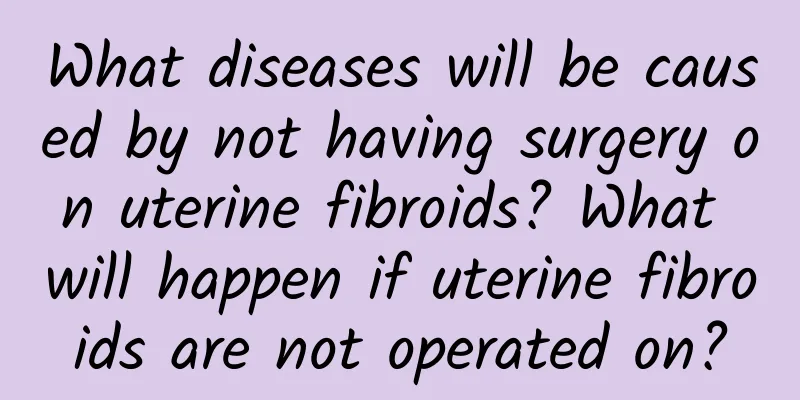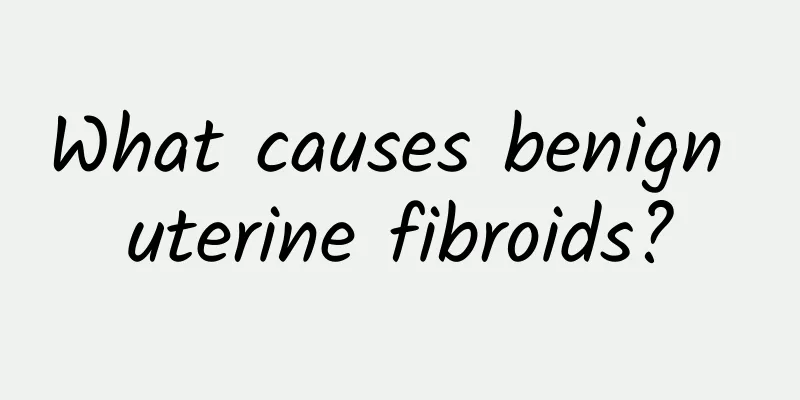What diseases will be caused by not having surgery on uterine fibroids? What will happen if uterine fibroids are not operated on?

|
Uterine fibroids are a common gynecological disease, which refers to benign tumors that grow on the uterine muscle layer or uterine wall. Although most uterine fibroids are benign, they can cause many complications and diseases if not treated and operated on in time. So what diseases can uterine fibroids cause if not operated on? What will happen if uterine fibroids are not operated on? 1. Uterine bleeding: Uterine bleeding is one of the most common complications of uterine fibroids if not treated surgically. The enlargement of uterine fibroids will cause pressure on the endometrium and uterine wall, leading to increased menstrual flow and prolonged menstrual period. Long-term non-treatment can lead to health problems such as anemia. 2. Dysmenorrhea: Intrauterine compression caused by uterine fibroids may also cause dysmenorrhea. The growth of fibroids causes the uterine wall to expand, putting pressure on the tissues and nerves around the uterus, which in turn causes pain. Dysmenorrhea not only affects women's quality of life, but may also affect fertility. 3. Infertility: Uterine fibroids may also lead to infertility if not treated surgically. The location and size of uterine fibroids will hinder the implantation of the fertilized egg. At the same time, fibroids will interfere with the normal contraction of the uterine muscles, affecting the implantation and gestation of the embryo. If uterine fibroids are not treated with surgery, they may also cause other symptoms, such as frequent urination, painful urination, back pain, etc., which seriously affect women's quality of life and physical health. So, what should be done if uterine fibroids are not treated with surgery? Women should have regular gynecological examinations to detect and understand the condition of fibroids in a timely manner. If the fibroids grow slowly and the symptoms are not obvious, conservative treatment such as medication can be chosen. Medication can relieve symptoms, control bleeding, and relieve dysmenorrhea. However, even if medication can relieve symptoms, it cannot cure uterine fibroids. For patients with fibroids larger than 4 cm in diameter, obvious symptoms, rapid growth, or affecting fertility, surgery is a better choice. Surgical treatment can completely solve the problem by removing the fibroids or removing the uterus. Common surgical methods include laparoscopic surgery, uterine artery embolization, and myomectomy. After the operation, the patient needs to follow the doctor's advice for postoperative care and recovery to ensure the health and function of the uterus. If uterine fibroids are not treated surgically, they may cause complications and diseases such as uterine bleeding, dysmenorrhea, and infertility. Therefore, for women with uterine fibroids, regular gynecological examinations and timely treatment are very important. Only by correctly choosing the treatment method that suits you can you ensure your health and quality of life. Uterine fibroids are common benign tumors in gynecology. They can be divided into fibroids in the uterus, uterine wall, and uterine cavity. The specific cause of uterine fibroids is still unclear, but genetic factors and hormonal imbalance may be related to it. Symptoms of uterine fibroids include menstrual disorders, menorrhagia, dysmenorrhea, etc. Due to the slow growth of fibroids, many patients may not know that they have fibroids for a long time. Therefore, regular gynecological examinations are an important means of preventing and early detection of uterine fibroids. At the same time, good living habits and a healthy diet are also conducive to preventing the occurrence of uterine fibroids. |
>>: What is the recurrence of uterine fibroids? What should I do if uterine fibroids recur?
Recommend
Be careful of ectopic pregnancy when these symptoms appear!
What are the symptoms of ectopic pregnancy? For p...
What should you pay attention to after painless abortion?
Painless abortion has become the preferred soluti...
What are multiple uterine fibroids? What are the causes of multiple uterine fibroids?
I believe many people know about uterine fibroids...
What are the preparation procedures before painless abortion surgery?
As life becomes more open, many women need to use...
What complications can vaginitis cause?
Vaginitis, or inflammation of the vagina, is a gr...
What are the symptoms of bacterial vaginosis?
The most common disease in the vagina is vaginiti...
Abdominal pain and abnormal vaginal discharge
Dull pain in the lower abdomen accompanied by an ...
What are the treatments for habitual miscarriage?
Nowadays, many young lovers or couples do not pay...
Will vaginitis in children cause low-grade fever?
Will vaginitis in children cause low-grade fever?...
Daily care of adnexitis is very important
Female adnexitis is a common disease, especially ...
Explain the diagnostic method of chronic cervicitis
Cervicitis is a common disease among women of chi...
How long does it take to recover after abortion?
Abortion usually refers to artificial miscarriage...
The harm of cervical warts to pregnant women
Cervical warts themselves are actually not that s...
Why does pelvic peritonitis recur?
Speaking of pelvic peritonitis, I think everyone ...
The secrets of eating Japanese food without gaining weight
Japan is a country full of unique culture. Japane...









